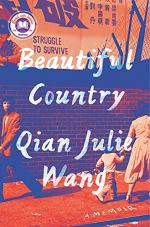|
This section contains 391 words (approx. 1 page at 400 words per page) |

|
Beautiful Country: A Memoir Summary & Study Guide Description
Beautiful Country: A Memoir Summary & Study Guide includes comprehensive information and analysis to help you understand the book. This study guide contains the following sections:
This detailed literature summary also contains Topics for Discussion on Beautiful Country: A Memoir by Qian Julie Wang.
The following version of this book was used to create this study guide: Wang, Qian Julie. Beautiful Country: A Memoir. New York: Doubleday, 2021.
In this memoir, Qian Wang recounts her experience of living in the United States as a child. She was born in northern China. Her father worked as a teacher, and her mother was a published academic. They had a comfortable middle-class life, but they did not want to live under China’s strict governmental regime. When Qian was five years old, her father moved to New York City. There, he worked for two years to raise money to bring his wife and daughter to America too.
Qian and her mother arrived in New York City when Qian was seven years old. They lived in a cramped apartment in Brooklyn and struggled with deep poverty. Qian’s father worked basic clerical functions in a law office. Qian’s mother worked very strenuous jobs, including working in a sweatshop. Because they were undocumented immigrants, they could only acquire undocumented jobs, which paid very little.
Qian attended a local public school. In second grade, she spoke very little English, and she felt very excluded from her peers. By the third grade, she was mostly fluent in English. She made a friend, and she had a teacher who was supportive of her newfound interest in reading. She had a generally ineffective teacher in the fourth grade, and her fifth grade teacher was overtly racist and prejudiced towards her.
Qian and her parents avoided going to the parents, as they had no health insurance. They also had very little money for food and often struggled with malnutrition. At one point, Qian’s mother became very sick and required surgery. She became sick again later; she was diagnosed with pancreatitis, and the doctors said that improper nutrition was the likely cause.
The relationship between Qian’s parents declined as they both struggled with the physical and emotional tolls of their life in America. Additionally, Qian’s mother began expressing by desire to leave the United States, but her father wanted to stay. One day, Qian’s mother informed Qian that the two of them would be relocating to Canada without Qian’s father. In Canada, Qian and her mother attained documented immigration status and had better access to food, healthcare, and education.
Read more from the Study Guide
|
This section contains 391 words (approx. 1 page at 400 words per page) |

|



